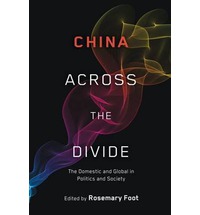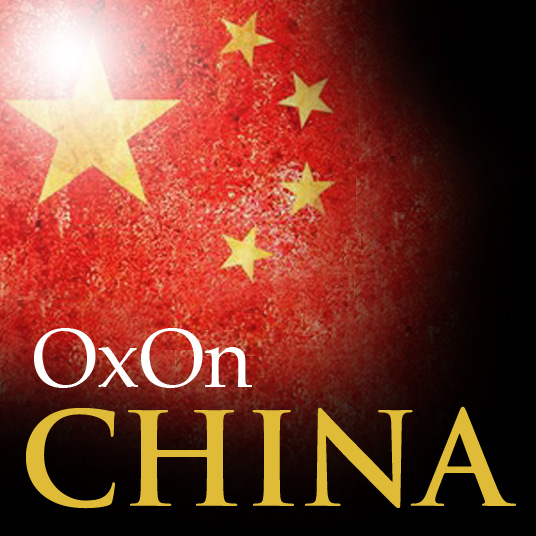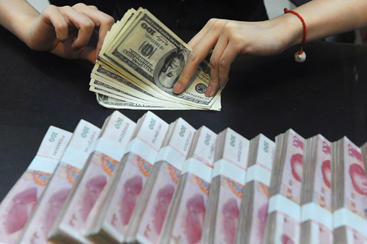
Q&A: China Across the Divide: the domestic and global in politics and society
I recently interviewed Professor Rosemary Foot about her new book, China Across the Divide: the domestic and global in politics and society (New York: Oxford University Press, 2013), as part of Politics and Spires’s OxOn China series.
NH: What is the book about?
RF: The book’s main argument is that, as students of international relations, we need to do more to collapse the divide between the domestic and global spheres of analysis. I make this argument with special reference to China, but I think it can be applied to other countries. I have chosen three main approaches to illustrate this phenomenon of the interconnectedness between the global and domestic levels of analysis. The first section of the book looks at ideas emerging from within China itself, at both mass and elite levels, about the country’s place in the world and how it should conduct its external relations. The argument is not that these ideas determine policy decisions, but help to shape, or set the broad contours of, the decisions that are arrived at. The second section looks at involvement in inter-societal enmeshments between China and other countries, and both the intended and unintended consequences of these linkages. This part of the book looks at the ways in which these non-state relations are transforming not only China itself but also the world of which it is a part. The third section focuses on three major global issues that are salient or intrusive at the domestic level and which require either some alterations in domestic ways of life or generate resistance at the domestic level to that intrusiveness.
NH: What inspired you to write/edit it?

Misperceptions in the Way of Stronger Russia-China Ties
Xi’s recent visit to Russia is unlikely to spur more initiative from Russia to expand bilateral ties beyond trade agreements. This is mainly due to Russia’s misconceptions about China and the nature of their relationship.
As I first crossed the China-Russia border from Heilongjiang Province into Primorsky Krai back in 2007, I stepped into a different world. On the bus that took me across the border, the many Chinese passengers were far more friendly and talkative than the few Russian travellers on board, hauling back Chinese merchandise. I had left Suifenhe, a town bustling with activity, including Russian tourists and traders, and suddenly found myself in a desolate and unwelcoming Pogranichniy.
Most people who have crossed that border will recognise those contrasting impressions, which are symbolic of the two countries’ unequal standing. Last year, China’s GDP grew twice as fast as Russia’s. At the same time, investment as a part of GDP, a measure of potential future growth, was 46 percent in China versus only 23 percent in Russia. China’s growth in influence is truly global and multi-dimensional. Russia’s is mostly limited to the “Near Abroad”, and seems highly correlated with the price of oil and gas. Bilateral trade relations also reflect rising inequalities. Whereas in 2010 China became Russia’s leading trading partner, Russia was not in China’s top 10.Despite an 11 percent rise in the value of trade between the two countries in the past year, the potential for collaboration is far from fulfilled.

The new political regime in China: is it business as usual?
Dramatic changes do not appear to be on the agenda in China, at least at the surface level. The new political regime, under the stewardship of Xi Jinping, inherited an economy with widening socio-economic disparities and accompanying social welfare concerns. Farmers, migrant workers and lower/middle-class urbanities grumble about rising living costs, and a perceived lower quality of life. Their concerns are further cemented by greater public awareness of corruption in both the state and non-state sectors. This may be the cause of lower levels of trust and confidence in public and private institutions by the general public.
But in spite of the discontent, changes are happening. Administrative in nature, perhaps, these changes will have strong implications for state-society relations going forward.
What can we expect?

Liberty, Liberalism and Surveillance: a Q&A with Quentin Skinner
One of England’s most distinguished scholars, Quentin Skinner is a leading historian of political thought and an outstanding advocate of a contemporary republican viewpoint. This interview with Richard Marshall of 3:AM sets out an accessible overview of a lifetime of work. We are grateful to 3:AM for letting us republish it as part of Politics and Spires’ Democractic Wealth series. Open Democracy, our series partner, added at the end two additional questions about corporate power, surveillance and freedom. Skinner’s answer with respect to surveillance is a strong, clear statement of how it is a threat to liberty. This is especially relevant to current affairs given the superficiality of official and in particular British media responses to the Snowden revelations published by the Guardian’s Glenn Greenwald about the programmes of total surveillance being attempted by US and UK secret services.
RM: You are known as a leading historian of political history and in particular the formation of ideas around human liberty. One of the key ideas you’ve written about is what you label ‘neo-Roman’ liberty’. This began back in Ancient Rome didn’t it, where freedom was contrasted with slavery, wasn’t it? Can you tell us what its distinctive traits are?
QS: The vision of personal freedom that interests me is articulated most clearly in the Digest of Roman Law, which is why I have wanted to describe its later manifestations as examples of ‘neo-Roman’ liberty. The fundamental distinction drawn at the outset of the Digest is between the liber homo, the free person, and the servus or slave. The law needed to begin with this contrast because law applies only to free persons, not to slaves. So one crucial question was: what makes a slave? The answer given in the legal texts is that a slave is someone who is in potestate, in the power of a master. The contrast is with someone who is sui iuris, able to act in their own right. Long before these argument were summarised in the legal texts, they had been elaborated by a number of Roman moralists and historians, above all Sallust, Livy and Tacitus. These writers were interested in the broader question of what it means to say of individuals – or even of whole bodies of people – that they have been made to live in the manner of slaves. The answer they give is that, if you are subject to the arbitrary will of anyone else, such that you are dependent on their mere goodwill, then you may be said to be living in servitude, however elevated may be your position in society. So, for example, Tacitus speaks of the servitude of the entire senatorial class under the Emperor Tiberius, so wholly subject were they to his lethal caprice.

The Chinese transformation of corporate culture
Chinese state-owned enterprises of the 1980s reigned infamous for their inefficiency, poor quality and total dearth of customer service. There was simply too much politics and not enough emphasis on actually making products. Meanwhile, smaller, privately-managed corporations which filled in market gaps left by the state, were prone to fraud, exploitation, instability and short-term attitudes. They tended to collapse very quickly; overnight the boss might get arrested or leave with all the company’s money.
But some of these firms looked to the West and to Japan for inspired ideas to kick-start their ailing businesses. Among them was Zhang Ruimin, CEO of Haier Group, which started out as a struggling collectively-owned fridge manufacturer. As company legend goes, in 1984 Zhang checked one batch of Haier’s products and found 76 fridges to be defective. Rather than follow the usual practice of passing them on to second hand stores or employees, Zhang lined up all the defective fridges, took a sledgehammer and, with the help of Haier employees, smashed them to pieces to show that the company would not tolerate poor quality. He then introduced a rigorous quality control system to build a new “cultural mindset” of quality in his employees.

China’s international investment policy
Accession to the World Trade Organization (WTO) on 11 December 2001 was a watershed for China’s international economic relations. Joining the WTO meant that, after two decades of gradually opening its economy and markets, China formally accepted both the benefits and obligations of membership in a multilaterally negotiated rules-based regime governing international trade. The long march towards WTO accession – its pitfalls and challenges as well as the impressive surge in China’s import and export figures thereafter – have been well documented. But, somewhat in the shadows of these remarkable achievements in the field of multilateral trade policy, foreign investment has emerged as another important component of China’s international economic relations.

Is there a radical politics of virtue?
In today’s commercial republics, the “commercial” and the “republican” seem to be at odds. Commerce generates vast inequalities of wealth; the labor market generates overwork, underemployment, and precariousness; citizens are subject to myriad forms of coercion, surveillance and discipline. Yet a republic is supposed to uphold the freedom and equality of its citizens. Worse yet, the tradition of ‘republican’ political thinking seems to have only extreme answers available to it. In the name of protecting the virtue of its citizens, republicanism has often been hostile to the very idea of commerce. The production and accumulation of wealth, the enjoyment of luxury and leisure, are seen as corrupting private pursuits, drawing citizens away from public life and fracturing any sense of shared commitment to equality and the common good. The only solution is radical regulation. Impose severe restrictions on the production and consumption of wealth, eliminate wealth and poverty, and impose relative uniformity in economic activity. This was the classical republican solution, and neo-republicans have not done much to dislodge this view. As Jessica Kimpell put it in a previous post, “it would seem that contemporary thinkers would be even more vulnerable to this problem than classical republicans.”

Sino-Japanese War: A Q&A with Dr Rana Mitter, author of “China’s War with Japan, 1937-1945: The Struggle for Survival”
For the past few years, Professor Rana Mitter, one of the co-editors of our China blog, has been engaged in a research project aiming to better understand the process and relevance of the Sino-Japanese War between 1937 and 1945. Recently, he published his main findings in a volume that discusses the social, political and economic repercussions of the Japanese invasion and the Chinese response. We sat down with him to discuss it in more detail.
OxOn China (OC): What is the most important thing we need to know about the war with Japan?
Rana Mitter (RM): What distinguishes the Sino-Japanese war is that it really provides a breakpoint for Chinese modernity. A whole variety of longstanding traditions, patterns of landholding, and economic structures, changed forever. The fact that large swathes of Chinese territory were invaded and occupied was enormously disruptive. Local elites, for example, found themselves refugees, supplanted by an alien power. The political powerbase changed very suddenly, paving the way for the Communist revolution.









